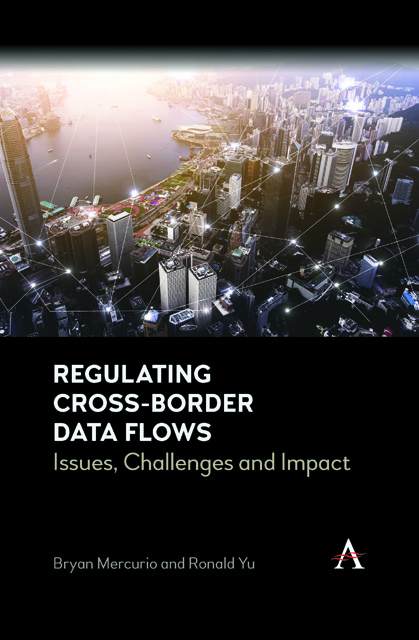4 - A Case Study of Hong Kong
Published online by Cambridge University Press: 22 November 2022
Summary
Characterized by a transparent regulatory system and a laissez-faire type of openness to commerce, Hong Kong is a major international business centre with over 4,000 regional headquarters and offices of leading multi-national corporations that attract significant international data flows (Hong Kong Government, 2021). A technically sophisticated smart city with high levels of internet connectivity (e.g. mobile subscriber penetration exceeds 280 per cent, and the average internet downloading speed ranks among the top three fastest cities in the world) and an extensive external telecommunications infrastructure comprising 11 submarine optical fibre cable systems (providing about 90 TB/s capacity), 20 overland optical fibre cable systems and 11 satellite systems. Hong Kong also boasts of being one of the safest cities for data centres in Asia (Hong Kong Innovation and Technology Bureau, 2020).
Hong Kong's approach to managing cross-border data flows is in line with its approach to commerce – and is based on a ‘by default’ policy of patchwork legislation and FTA commitments. The question is whether Hong Kong can remain thriving with a by default approach or whether it needs a coordinated policy. To answer the question, we must first assess Hong Kong's objectives and its uniqueness.
This chapter examines Hong Kong's ambitions to be a leading business centre, the importance of data to achieving these goals and salient data-flowrelated issues, whether Hong Kong should adopt a coordinated data flow policy and the key points Hong Kong must consider in deciding whether or not to formulate such a policy.
The Ambitions of Hong Kong
Hong Kong is a successful financial gateway to China and a regional, if not global, finance hub, featuring a high degree of liquidity. Home to many financial institutions providing a wide range of financial products and services to local and international investors, Hong Kong is widely viewed as a leading financial centre in Asia. Its legal system is an important ingredient in its success in financial services, with investors and businesses attracted by the security and predictability of the territory's strong adherence to the rule of law. Illustrating these points was Hong Kong's rating in the 2020 Heritage Foundation's Index of Economic Freedom, where the territory ranked 2nd among 186 economies in terms of economic freedom and 15th in the category ‘Government Integrity’, under the heading ‘Rule of Law’ (Heritage Foundation, 2021).
- Type
- Chapter
- Information
- Regulating Cross-Border Data FlowsIssues, Challenges and Impact, pp. 39 - 58Publisher: Anthem PressPrint publication year: 2022

